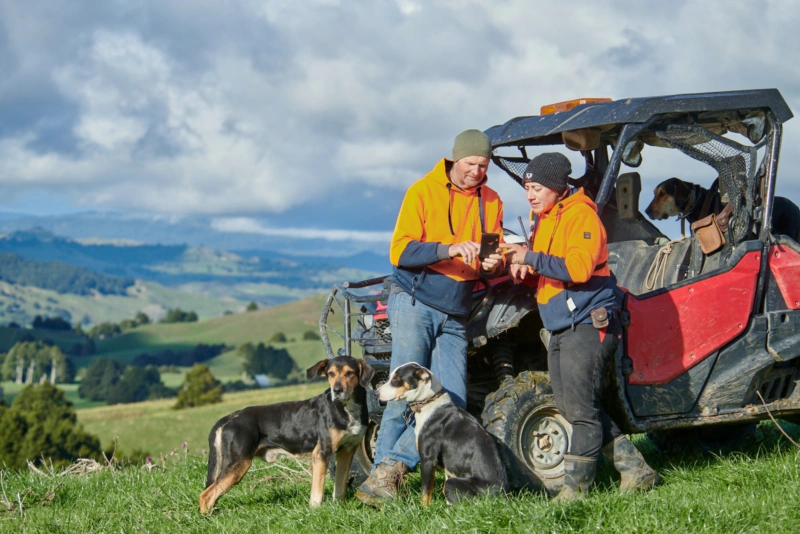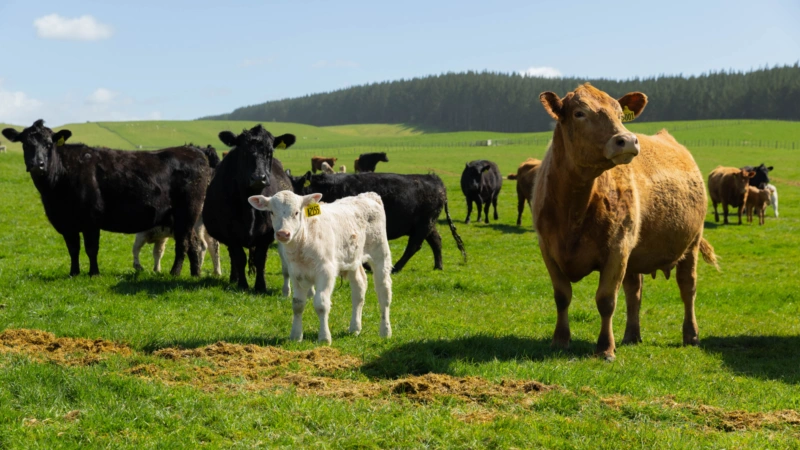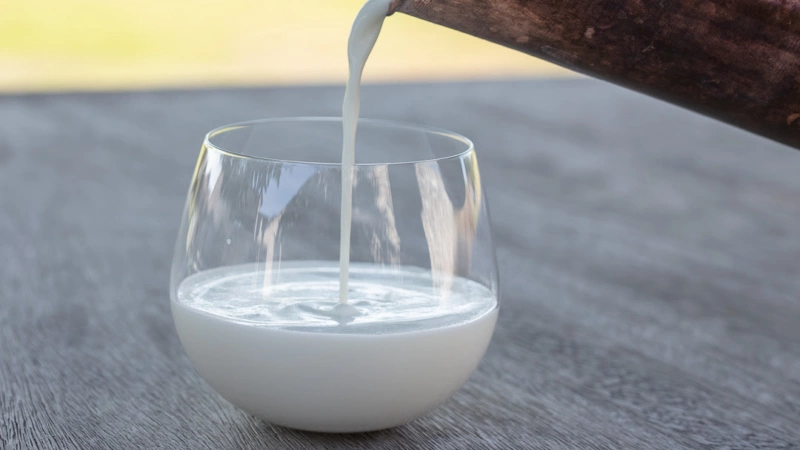Innovation at Pāmu
From genetic breakthroughs to renewable energy, innovation is at the heart of how Pāmu shapes the future of farming in Aotearoa.
Sectors of innovation
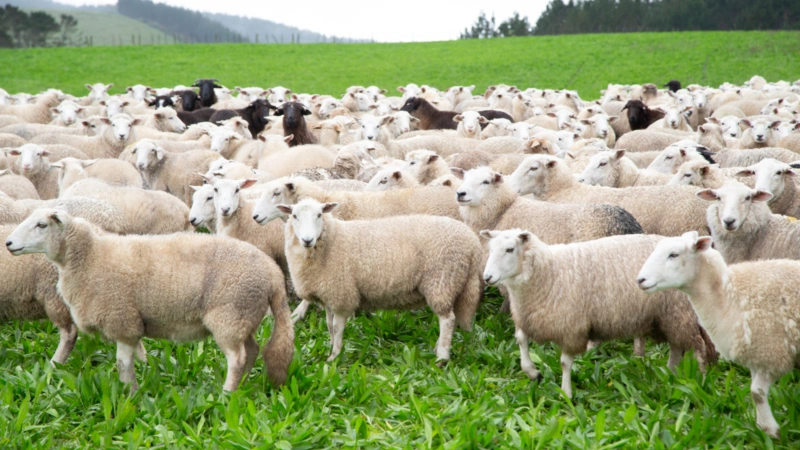
Sheep of the Future
Sheep of the Future is a seven-year collaborative programme between Pāmu, our subsidiary Focus Genetics, and the Ministry for Primary Industries (MPI). It’s designed to help New Zealand farmers adapt to shifting environmental conditions, evolving consumer expectations, and increasing compliance demands—without compromising performance or profitability.
At a time when traditional sheep farming faces mounting challenges—climate change, land use pressures, rising disease risk, and marginal wool returns—the programme offers a practical, science-backed path forward. At its core is a breeding flock based at Kapiro Station, a 3,000 hectares commercial Pāmu farm in Northland. The sub-tropical climate provides real-world testing conditions for heat, humidity, and disease pressure. The flock includes 2,000 mostly Romney-based ewes selected for productivity and facial eczema tolerance, alongside a 150-ewe control group for benchmarking.
Rams from a diverse mix of domestic and international breeds—including shedding and subtropical types—are being trialled for traits that could benefit New Zealand’s future farming systems. By building resilience into the sector, Sheep of the Future supports rural communities, national exports, and New Zealand’s reputation for ethical, sustainable agriculture.
Read more:
Dairy Beef Integration
What is dairy beef?
Pāmu is aiming to rear all calves born on its dairy farms by 2030. Beef sires over dairy means non-replacement calves can be raised for meat production. Pāmu is currently raising 65.5% of the calves produced. New Zealand’s dairy products are globally valued for their grass-fed origins. Unlike indoor systems used elsewhere, our cows graze outdoors – bringing seasonal challenges. Most calves are born in spring, requiring simultaneous rearing at scale. Significant changes to farm systems, capabilities in calf care, forage management, finishing, and processing are required to make dairy beef at scale attainable.
Calf-rearing facilities enabling dairy beef
The Pāmu dairy beef strategy is bold and designed to reshape the way dairy farming intersects with beef production. At its heart is a commitment to use all dairy calves in the company’s farming system by 2030, ensuring that every non-replacement dairy calf born on Pāmu farms is raised for low carbon protein. To achieve this, Pāmu is undertaking a farm system change that brings together its dairy, livestock, genetics, agronomy, and commercial teams. The strategy hinges on matching the right land with the right animals, using high-genetic-merit sires to produce calves that are well-suited for beef production. These calves are then raised in systems optimised for fast growth and feed efficiency, reducing greenhouse gas emissions and improving overall productivity.
Head of Innovation and Extension Paul McGill says operational changes are significant.
“Farm systems are being redesigned to accommodate larger numbers of calves, with adjustments to pasture management, infrastructure, and stock flows. Pāmu is investing in new calf-rearing facilities, expanding existing ones and partnering with industry rearers to support the increase in demand.”
The development of the Moutoa Calf Rearing Facility in FY25 is another example of strategy in action in the lower North Island. Located at Cheltenham Downs in the Manawatū and integrated into existing operations, the facility supports the company’s dairy beef ambitions as well as lifting productivity and demonstrating collaboration across teams.
The Moutoa initiative follows developments in other regions, including on the West Coast and central North Island, and is a blueprint for how strategic intent can be translated into meaningful, measurable impact across the Pāmu farming landscape.
“As our strategy continues to evolve, it positions Pāmu not just as New Zealand’s largest farmer, but as a catalyst for change in New Zealand agriculture,” Paul McGill says. P
rogress on dairy beef at Pāmu has been steady. As of FY25, Pāmu is raising 65.5% of its dairy calves, with a target of 85% by FY28. The final stretch – reaching 100% – is acknowledged as the most challenging, requiring tailored solutions that reflect the diversity of Pāmu farming operations across regions.
Read more:
- Pāmu and LIC to launch Synergizer® in 2026
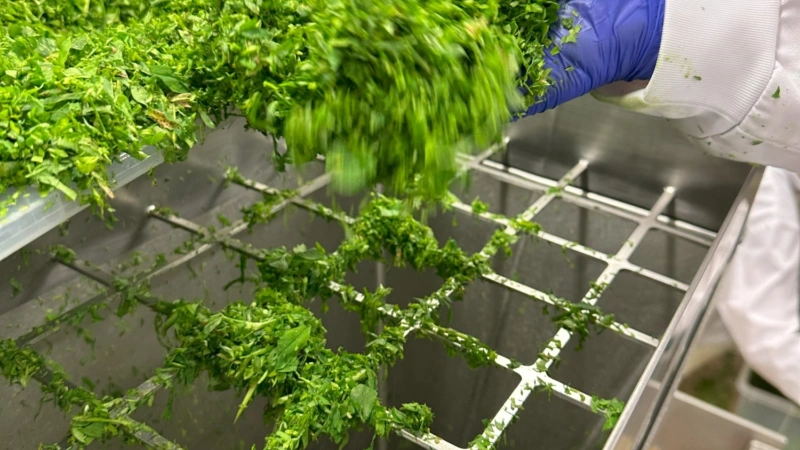
Leaf Protein
New Zealand's pastoral landscapes, abundant in protein-rich crops like lucerne (alfalfa), perennial ryegrass, and brassica rape, present a unique opportunity to diversify our protein sources. Historically, extracting high yields of protein from plant leaves has been challenging. However, recent advancements by Plant & Food Research have developed innovative processes to recover a broader spectrum of proteins from these crops, surpassing traditional methods that targeted only a single protein type.
Collaborating with Plant & Food Research and supported by Silver Fern Farms during Phase 1, our Cheltenham Downs farm serves as the pilot site for this groundbreaking initiative. The project focuses on extracting protein-rich juice from lucerne, aiming to refine processing methods to improve yield while maintaining functionality suitable for various food applications. This approach not only offers a new avenue for plant-based protein production but also addresses environmental concerns by potentially reducing nitrogen leaching into waterways, a common issue with traditional livestock farming.
The "Protein from Pasture" project aspires to establish a scalable, sustainable plant protein industry in New Zealand, targeting a contribution of over $1 billion to the economy. By leveraging existing dairy processing technologies, the project aims to create a dual protein system that integrates livestock and plant protein production. This initiative aligns with New Zealand's goal of doubling exports and positions the country as a leader in sustainable agriculture and plant-based food production.
Learn more:
Pāmu Deer Milk
Our innovative Pāmu Deer Milk offers exquisite flavors and serves as a sophisticated ingredient with diverse culinary applications. Clinical trials have demonstrated that consuming Pāmu Deer Milk improves muscle mass and physical performance, highlighting its potential in both gourmet cuisine and health-focused products.
Read more this on the Pāmu Deer Milk website.
